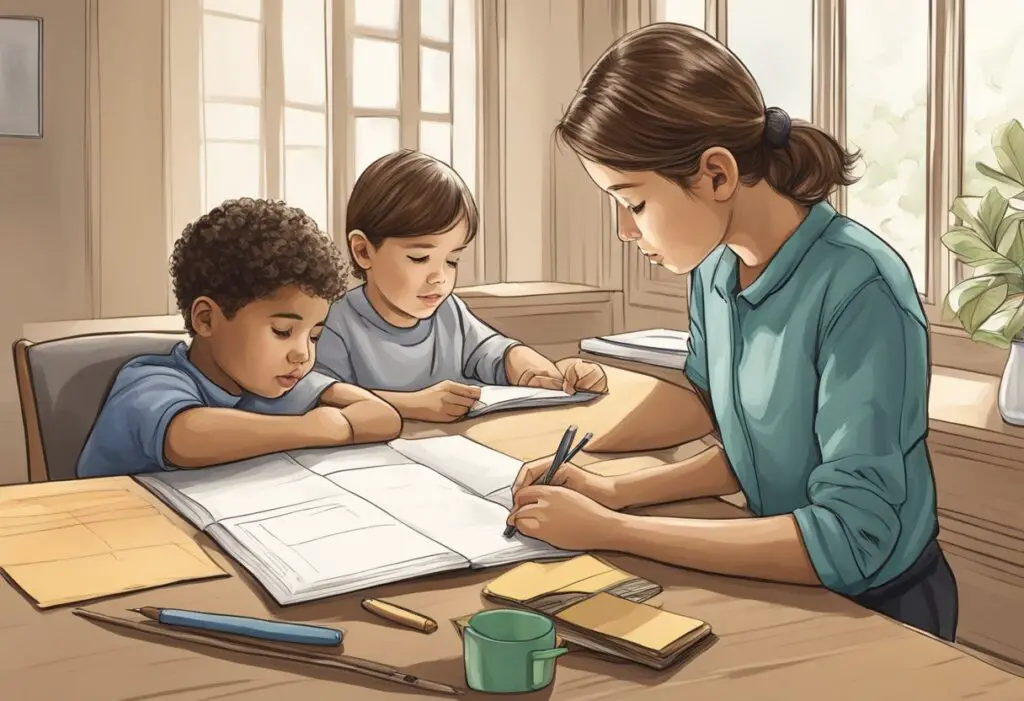So, your child comes home from school with a less-than-perfect grade on their latest assignment.
You might be tempted to ask them what went wrong or why they didn’t do better. But what if instead of focusing on the result, you celebrated their effort?

It’s easy to get caught up in the idea that success is measured solely by grades or achievements. However, by shifting your child’s focus from results to process, you can help them develop a growth mindset and a love of learning. When you celebrate your child’s effort, you’re teaching them that hard work and dedication are just as important as the end result.
Education is about more than just getting good grades. It’s about learning and growing as a person. By celebrating effort, you’re helping your child develop the skills they need to be successful in all areas of life. So, the next time your child comes home with a less-than-perfect grade, take a moment to celebrate their effort. Who knows? Maybe they’ll surprise you with their next assignment.
The Comedy of Effort vs. Results
As a parent, you want your child to succeed in everything they do. You want them to be the best and achieve greatness. But sometimes, focusing too much on results can lead to disappointment and a lack of motivation. That’s where celebrating effort comes in.
The Jokes on Results
Results can be a tricky thing. You can work hard and do everything right but still not get the outcome you were hoping for. It’s like telling a joke and not getting a laugh. You put in the effort, but the result falls flat.
Instead of focusing solely on the end result, encourage your child to celebrate the process and the effort they put in. Just like a comedian who may not get a laugh on one joke but keeps going and eventually gets the audience rolling with laughter, your child can learn to appreciate the value of effort and perseverance.
The Punchline of Effort
Effort is the punchline to success. It’s what makes the end result so satisfying. Imagine watching a stand-up comedian who effortlessly delivers a hilarious set. You may appreciate the humor, but you won’t appreciate the effort that went into crafting that routine.
-

Bold Male Pride – Baseball Trucker Cap Celebrating Masculinity
$25.00 Select options This product has multiple variants. The options may be chosen on the product page -

Dad Bod Appreciation Gift Mug
$19.00 Add to cart -

Dad Bod, Bad Jokes Structured Baseball Cap
$30.00 Select options This product has multiple variants. The options may be chosen on the product page
Similarly, when your child puts in effort towards a goal, they develop a sense of achievement and pride in their work. They learn to value their strengths and develop the motivation to keep going, even when things get tough.
So, the next time your child brings home a participation trophy or a lower grade than expected, remember to celebrate the effort they put in. Encourage them to keep going and to appreciate the process. With effort and perseverance, success is just a punchline away.
The Hilarious Art of Praising Effort
Encouraging your child to focus on the process rather than the outcome is a great way to help them build self-esteem and resilience. But, let’s be honest, it’s also an opportunity for some hilarious praise. Here are some examples of how you can praise your child’s effort in a way that will make them laugh and feel good about themselves.
Laughing at the ‘Good Job’
The phrase “good job” is often used to praise children, but it’s not very specific or meaningful. Instead, try to be more specific about what you’re praising. For example, if your child is working on a puzzle, you could say, “Wow, you’re really persistent! You didn’t give up even when it got tough.” Or if they’re practicing a musical instrument, you could say, “I can tell you’ve been practicing a lot. Your hard work is paying off!”
The Chuckles of ‘You Worked Hard’
Another way to praise your child’s effort is to acknowledge the hard work they put into something. You could say, “I can see how much effort you put into this project. You should be proud of yourself!” Or “You worked really hard on that math problem. I’m impressed with your determination.” By acknowledging the effort your child puts in, you’re helping them build their self-esteem and confidence.
In conclusion, praising effort is a great way to help your child build resilience and self-esteem. By being specific about what you’re praising and acknowledging the hard work they put in, you’re helping them focus on the process rather than the outcome. And let’s not forget; it’s also an opportunity for some hilarious praise that will make your child laugh and feel good about themselves.
The Sitcom of Strategies for Shifting Focus

Shifting your kids’ focus from results to process can be challenging, but it doesn’t have to be boring. In fact, it can be downright hilarious. Here are some strategies to help you and your kids celebrate effort and enjoy the process of learning and growing together.
The Giggles of Goal Setting
Setting goals is a great way to help your kids focus on the process of learning and growing rather than just the end result. But it doesn’t have to be all serious and boring. In fact, it can be quite funny.
Try making a game out of goal setting. Write down a list of goals on small pieces of paper and put them in a jar. Then take turns pulling out a goal and trying to achieve it. You could even set up a reward system for each goal achieved, such as a silly dance party or a special treat.
The Chuckles of Challenges
Challenges are a great way to help your kids develop resilience and perseverance. But they can also be a lot of fun.
Try setting up a challenge that involves a silly or funny task, such as a relay race while wearing clown shoes or a game of tag while hopping on one foot. The key is to make the challenge enjoyable and lighthearted so your kids will be more likely to embrace the process of learning and growing.
The Laughter of Learning from Mistakes
Mistakes are a natural part of the learning process, but they can be frustrating and discouraging for kids. That’s why it’s important to help them learn to embrace their mistakes and use them as opportunities for growth and improvement.
One way to do this is to create a “mistake museum” where your kids can display their mistakes in a lighthearted and humorous way. Encourage them to write down what they learned from each mistake and how they can use that knowledge to improve in the future.
Remember, learning and growing should be fun and enjoyable. By using humor and creativity to shift your kids’ focus from results to process, you can help them develop a love of learning that will last a lifetime.
The Comedy Club of Resources and Tools

As a parent, you are the owner of the comedy club of resources and tools. You engineer your space to maximize your children’s laughter and learning. Here are two acts that can help you create a better space to succeed.
The Stand-Up of Study Skills
Teaching study skills is like doing stand-up comedy. You need to engage your audience, make them laugh, and deliver a punchline that sticks. The first step is to help your child understand the process of learning. Learning is not just about getting good grades. It’s about developing skills that will help them succeed in life.
Here are some resources that can help you teach study skills:
- The Study Skills Handbook: A comprehensive guide to effective study techniques.
- Quizlet: An online learning tool that allows you to create flashcards, quizzes, and games.
- Khan Academy: A non-profit organization that provides free online courses and resources on a wide range of subjects.
Encourage your child to practice their study skills regularly. Like a comedian, they need to rehearse their routines to improve their performance.
The Improv of Instruction
Teaching is like doing improv comedy. You need to be flexible, creative, and responsive to your audience’s needs. The first step is to understand your child’s learning style. Some children are visual learners, while others are auditory or kinesthetic learners.
Here are some resources that can help you improve your instruction:
- Teaching with the Brain in Mind: A book that explains how the brain learns and provides practical teaching strategies.
- TED-Ed: A platform that allows you to create and share video lessons.
- ClassDojo: An app that allows you to communicate with parents, track student behavior, and share resources.
Encourage your child to ask questions and provide feedback. Like an improv comedian, you need to be open to suggestions and willing to adapt your performance to meet your audience’s needs.
Remember, celebrating effort is about focusing on the process, not just the results. By providing your children with the right resources and tools, you can help them develop the skills they need to succeed in life.
The Punchline of Persistence

Persistence is like a punchline – it’s the culmination of all your hard work that makes the joke (or in this case, the success) worth it. But how do you get your kids to understand that the punchline is just as important as the setup? By shifting their focus from results to process.
Motivate your kids to keep trying by emphasizing the effort they put in, rather than the outcome. When you praise your child’s persistence, you’re building their self-confidence and encouraging them to adopt a growth mindset. They’ll start to believe that their abilities can be developed through hard work and dedication rather than thinking they’re born with a fixed mindset.
One way to help your child develop persistence is to teach them to break down big tasks into smaller ones. This will make the task feel less daunting and more achievable. You can also encourage them to take breaks when they need to so they don’t get overwhelmed.
Another way to motivate your child is to make the process fun! Turn the task into a game or a challenge, and reward them for their efforts. This will make them more likely to stick with it and develop a sense of accomplishment.
Remember, persistence is the punchline that makes the joke worth it. By celebrating effort and shifting your child’s focus from results to process, you’re setting them up for success and helping them develop important life skills.







